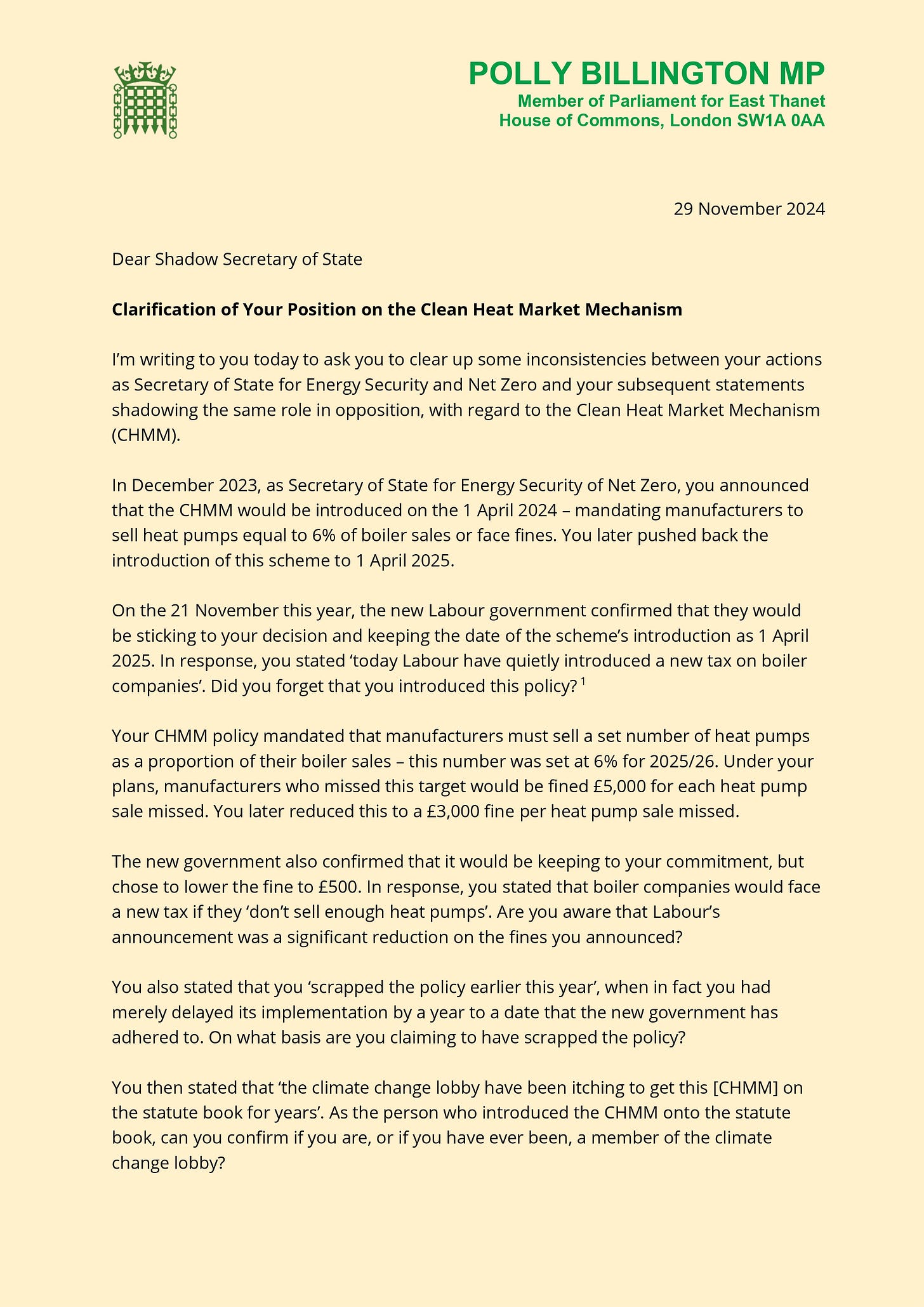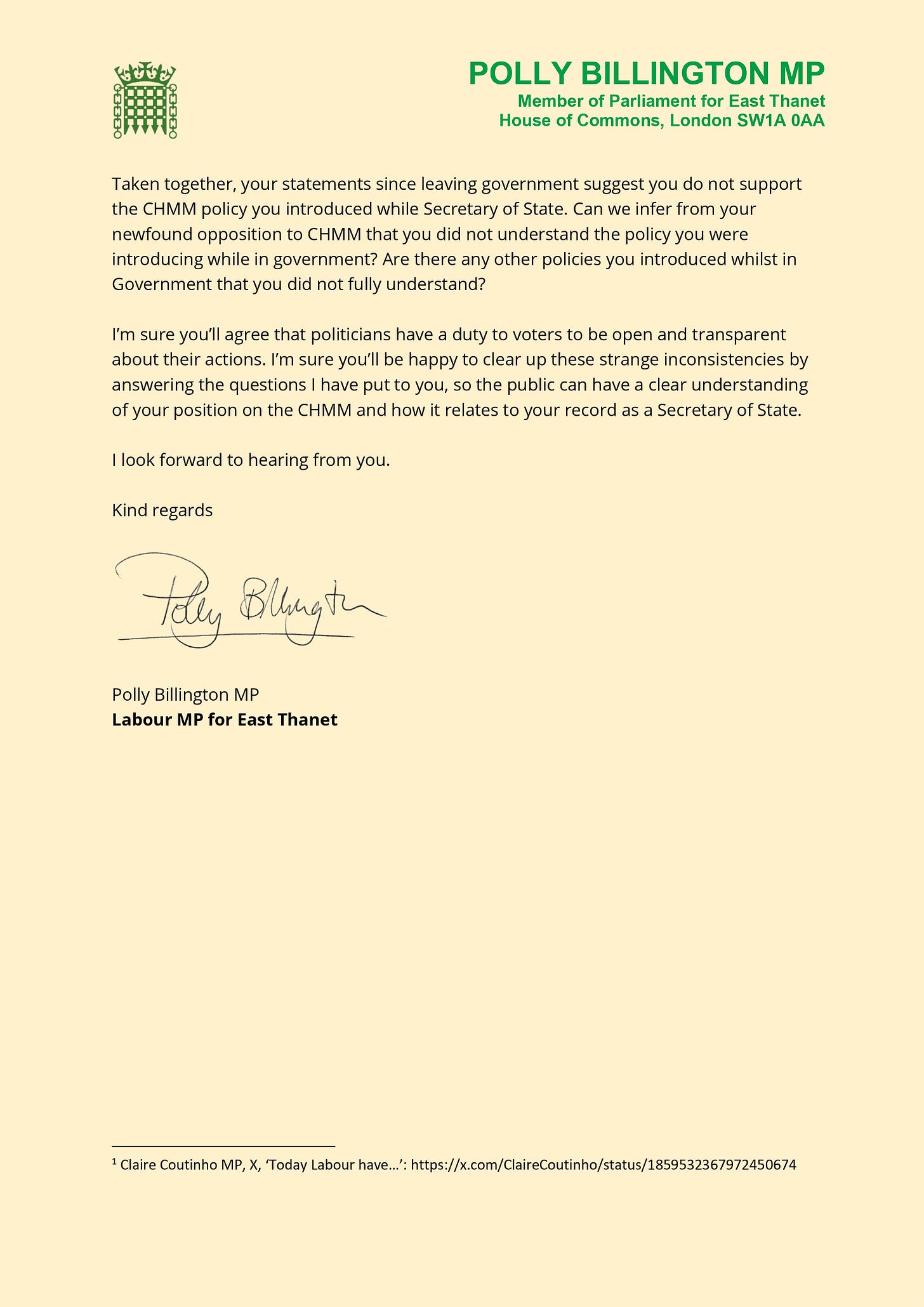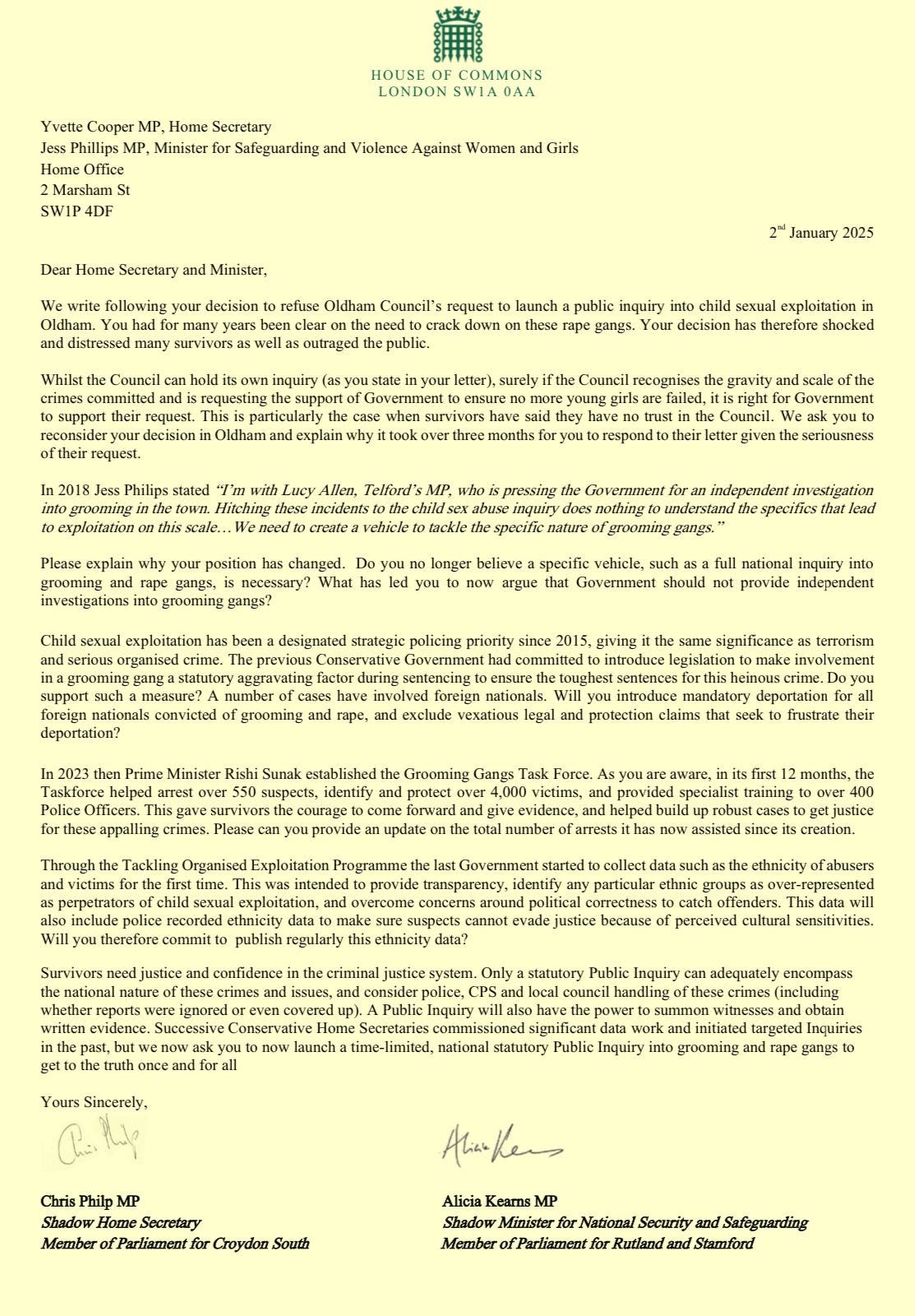Forgetting your record
Letter-based attack, and the need for honesty about changing your position
It’s often said that the art of letter-writing is dead. And there’s some truth in this, if my own WhatsApp-messages-sent-and-received-to-letters-sent-and-received ratio, or your own best estimate of the long-term viability of Royal Mail, is anything to go by. But the good old-fashioned letter remains a vital tool of political attack.
If a political party wants to keep a story going, writing a letter to their opponents is a good way of doing it - because “Politician writes letter” is enough of a hook for a journalist who wants a day two, or day three, or day five story to write one. Getting a day two, or day three, or day five story means another headline, which means a bit more attention getting paid to whatever the issue is, plus a contribution to the “this story has been going on for two/three/five days, putting pressure on [Leader X] to get a grip” meta political story which runs alongside any given actual political story.
As a former backroom attack person for Labour, I’ve written or worked on a fair few of these letters in my time, to be handed to willing backbenchers or willing shadow ministers for signature, and then to willing journalists for writing up. I particularly enjoyed writing one, I think during the early part of the 2010-15 parliament, which deliberately copied, word for word, large chunks of an equivalent letter written to us by the Tories. I can no longer remember which scandal we were complaining about, or which scandal they were complaining about, or even if they were different scandals,1 but I took great pleasure in condemning whatever it was we were condemning in the precise terms with which they had condemned whatever it was they were condemning.
The only possible audience for this - you can interpret it as an example of imitation being the sincerest form of flattery, or as a quiet performative warning to our opposite numbers that we were missing nothing, or just as evidence that I thought it was funny at the time - would have been a couple of Tory researchers who, I suspect, didn’t notice. Certainly nobody else noticed. But, you know, you have to make your own entertainment when your job is content creation.
My favourite piece of letter-based attack in a long time was a couple of months ago. It didn’t get the attention I think it deserved, because despite the skill of its construction and despite being very funny it just wasn’t about anything newsworthy enough for anyone to write up. It’s by Labour MP Polly Billington, to Shadow Energy Secretary Claire Coutinho, asking her why she is attacking a policy on heat pumps, the Clean Heat Market Mechanism (CHMM), that she put into effect herself when she was Energy Secretary. The policy is relatively obscure, but the letter nicely contrasts Coutinho’s claim that “As Secretary of State I scrapped this policy earlier this year” with the fact that she actually postponed it until April 2025, which is the date Labour has decided to stick with. And it contrasts Coutinho’s characterisation of the policy as “a new tax on boiler companies that don’t sell enough heat pumps” with the awkward fact that the “tax” (strictly speaking, a potential £500 fine) is lower than the £3,000 fine Coutinho had proposed herself.2
Billington’s questions to Coutinho are all fun. “Did you forget that you introduced this policy?” “Are you aware that Labour’s announcement was a significant reduction on the fines you announced?” “On what basis are you claiming to have scrapped the policy?” “As the person who introduced the CHMM onto the statute books, can you confirm if you are, or ever have been, a member of the climate change lobby?” And the last one is especially fun:
Taken together, your statements since leaving government suggest you do not support the CHMM policy you introduced as Secretary of State. Can we infer from your newfound opposition to CHMM that you did not understand the policy you were introducing while in government? Are there any other policies you introduced whilst in Government that you did not fully understand?
The key point Billington’s letter makes, over and over again, is that Coutinho has, either by accident or design, forgotten her record - and forgotten that things are more complicated than they look.
Knowing that things are more complicated than they look is a constraint of government which rarely binds the media and only sometimes binds opposition parties. When it does, it doesn’t always help. One of the things I remember about the period immediately following Labour’s election defeat in 2010, especially very early on when all the same former ministers were shadowing their old departments, was those former ministers’ wariness of making attacks that they knew were more about government in general being complicated than about the new government being bad. Recent government experience means you know where the bodies are buried, but it also means you know why they’re dead. There was more than one incident of an easy attack being foregone on the grounds that although a new coalition policy was being criticised in the media, it looked much more defensible to someone who had recently sat in the same office and been confronted by the same facts than it did to people who had never really thought about it before.3 This was in some ways commendable - you shouldn’t attack decisions you think are right, even if you are being urged to do so - and in some ways frustrating. Shuffling most former cabinet ministers into new shadow roles where they had less experience helped to make Labour more opportunistic - but not, of course, to win anything.
Kemi Badenoch’s keenness to attack Labour on immigration means that she, too, has forgotten her record. As a result, in two successive weeks last month when she raised it at PMQs, Keir Starmer was able to push back by pointing out that she had “stood up and praised the then Tory Home Secretary for listening to her on removing caps on migration visas. She was applauding it. Now, she is furious about what she was campaigning for.”4
Here’s a Labour attack video contrasting Badenoch’s admission of failure on immigration (admitting failure on immigration is itself, by the way, both a necessary prelude to and a poor basis for setting up a Tory attack on Labour, however much the Tories might think the attack is justified) with her previous call for relaxing limits on visas.
Immigration policy is more complicated than this, of course. But this is all Starmer needs for the time being, and Badenoch’s protest that “I was, in this House, asking for a lift in skilled migration” is tough to reconcile with her complaint that overall numbers are too high. If she’d remembered her record, she could have avoided getting attacked for it.
Thinking about your record is partly about thinking through whether a particular politician is the right person to front a particular intervention.5 Labour has a general attack on Tory failure on immigration, and a Badenoch-specific attack on Badenoch’s alleged hypocrisy in complaining about high immigration numbers having called for a relaxation in some immigration restrictions. Similarly, while the whole Conservative Party has to deal with the legacy of Liz Truss as a problem for its ability to attack Labour on the economy, it is a bigger issue for some of its leading members than for others.
Shadow Business Secretary Andrew Griffith was Economic Secretary to the Treasury during Liz Truss’s brief period as Prime Minister, and backed her beforehand, and this has got in the way of his ability to mount effective attacks on Labour, as witnessed by this appearance on Question Time against Labour’s Darren Jones:
And by this appearance in the House of Commons:
I can imagine that this is all very annoying for him, but it is part of the price the Conservatives should have known they were going to pay when they appointed him to a senior economic brief in the shadow cabinet.
Another member of Liz Truss’s Treasury team, former Chief Secretary to the Treasury Chris Philp, is now Shadow Home Secretary. In this capacity, alongside fellow shadow minister Alicia Kearns, he wrote a letter to Yvette Cooper and Jess Phillips last week calling for a full public inquiry into grooming and rape gangs, following on from similar calls by Elon Musk. As with so many letter-based stories, this was an attempt to generate another day of headlines on a story that’s difficult for the Government. On this, it succeeded, and at the time of writing the story is still running, although more of the running has been made by Elon Musk posting “Wow” and “Absolutely” and “Yes” and “Prison for Starmer” a lot - something that might have made Philp and Kearns think twice about jumping in, but apparently didn’t.6
The letter, as letters of this kind tend to do, pointed to differences between Phillips’s position on this in opposition in 2018 and her position in government now, asking “Please explain why your position has changed”. The problem here is that Phillips’s position is not the only one that has changed: the Conservative government similarly rejected calls for such an inquiry in 2022, for reasons similar to those given by the Labour Home Office now. No proposal for an inquiry of this kind appeared in the Conservative manifesto six months ago. This is another good reason for thinking twice about jumping in, but Philp and Kearns have forgotten their own record, and it undermines the credibility of their request.
Nobody is saying that politicians can’t or shouldn’t change. Defeated parties have to change and to show they’ve changed, and all successful leadership projects, from Blair’s to Cameron’s to Starmer’s, involve demonstrating how they have learned the lessons of defeat, corrected the mistakes the voters rejected them for, and moved with the times. Changing is not the problem.7
The problem is changing without being open about it. If Clare Coutinho wants to attack a Labour policy that’s a continuation of her own policy, she has to explain why her policy was wrong and why she’s changing it. If Kemi Badenoch wants to complain that immigration is too high under Labour, she can’t make speeches about immigration that acknowledge that the Tories “may have tried to control numbers, but overall we did not deliver”, and that say both that “we made mistakes” and that “mistakes were made”, but are incapable of identifying a single specific immigration policy that the Tories got wrong. If Andrew Griffith wants to talk about economic stability, he needs to have a better line - or indeed a line - on why he backed Liz Truss and why she failed. If the Tories want to call for an inquiry into grooming gangs now, they need to account for why now, and why not then. Change isn’t just about saying something different. It’s about saying why the thing you used to say was wrong.
This is why this anecdote lacks references.
In both cases, Coutinho may well argue that her intention in postponing the policy was to scrap it altogether, and that postponing it for a year was easier to do and a staging post on the route to scrapping it. But tough: as Secretary of State she was responsible for, and endorsed, the policy that existed at the time, and she didn’t scrap it, which is why Labour has not had to reintroduce it in order for it to happen on the date Coutinho set, and why Labour can legitimately claim that it is actually a watered-down version of Coutinho’s own policy.
This anecdote lacks references too. Sorry.
I wrote about the first time Badenoch raised immigration at PMQs, when she hadn’t intended to raise it at all but was goaded into doing so, here; the second time she raised it was more deliberate, but no more sensible.
For example, Shadow Chancellor of the Duchy of Lancaster Alex Burghart was a poor choice of front-man for a Tory attack on Labour’s “astonishing ‘new aristocracy’ of couples, relatives and nepo-babies”, and as the voice of the line “It’s all who you know or are related to”, given that he is himself the son-in-law of a former Conservative minister. This very silly story played out with the Sun covering the Tory attack and the Mirror covering the Labour rebuttal, meaning that almost nobody would have seen the full coverage apart from both sides’ researchers and, now, you. The original attack is very weak: it says that more than one Labour minister has a “family member” (relationship unspecified) who is a civil servant (role and seniority unspecified), which needs to be more specific for us to know whether it is actually shocking, or just boring. It also reveals the double scandal that not only is Angela Eagle Maria Eagle’s sister, but Maria Eagle is Angela Eagle’s sister too. Both the attack and the rebuttal amount to little more than observing that people who work closely together, or who have the same kinds of interests, sometimes end up going out with each other. Even if Alex Burghart had not been the son-in-law of a former Tory minister, you’d think someone involved in the production of the story might have stopped to ask whether they could think of any examples of Conservative politicians having family connections or relationships with other people involved in politics in some way.
You don’t have to read the whole letter, you know. Or the other one. It’s mostly there to add a block of colour and break up the text a bit, although I acknowledge that it breaks up the text with more, much smaller, text, which limits the effectiveness of the tactic.
The Kemi Badenoch graphic here is from her unsuccessful 2022 leadership bid, not her successful 2024 one. The fact that she stood for leader against Liz Truss, even though she did eventually serve in her cabinet after being knocked out, means that she does have more immunity against anti-Truss arguments than some of her colleagues. Not complete immunity though.






Has Starmer ever acknowledged that he was wrong to accuse Rishi Sunak of being soft on paedophiles? Or was that just a far right smear?